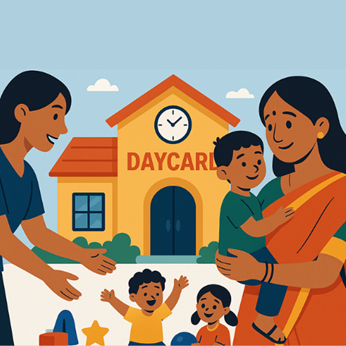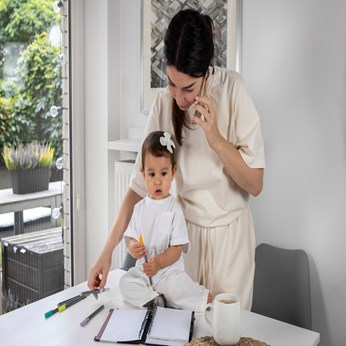Milestones to watch out for during the first 6 months of a baby
Discussing about the milestones a baby achieves at 6 months, it is best to understand that these are just guidelines; each child is unique and develops at his/her own pace. There are a wide range of activities that are considered normal, while there is a need to take care of certain activities that may be abnormal or are considered red flags.
Here are some developmental milestones, your role and red flags:
1a) Developmental milestones at 1 month:
During the first few days when you spend time feeding, changing diapers, settling him/her to sleep and responding to wails, he/she will take notice of your touch, voice and face.
Your baby can gaze at your face; the focus being between 8 to 12 inches. He/she’s will be drawn towards black and white patterns, with his/her hearing fully developed; your baby will be able to recognize familiar sounds as the mother’s voice.
He/she can lift her head and turn it to the side when on one’s stomach; but he/she cannot hold her head and neck when upright. He/she moves her/his arm jerkily and is able to get her hands close to her/his mouth.
b) Your role:
Know your baby by being attentive and responsive, cuddling him/her, talking to him/her and learning signals when he/she is sleepy or hungry.
Maintain eye contact with your baby by getting close to him/her, singing or reading to her/him.
Help her/him to strengthen one’s muscles by giving him/her plenty of tummy time; also encourage your month old to look and reach out for toys.
Ensure she/he has plenty of outdoor time with walks and time spent in a park or playground; your baby will relax being with other children.
When he/she is alert and in the moods play games like peek-a-boo or mimicking sounds with him/her.
Lastly understand when your month old baby has had enough play and needs time to relax.
c) Red flags:
Consult your doctor if your month old baby does not:
a) Feed steadily and suck well.
b) Have focus and is unable to watch moving things nearby.
c) React to bright lights.
d) Respond to loud sounds.
e) Seem flexible and is stiff and floppy.
2a) Developmental milestones at 3 months:
It is time you enjoy the warmth of your baby’s smile as he/she babbles and mimics the sounds you make and amuses you by imitating facial expressions.
He/she no longer needs support for one’s head; he/she is able to lift one’s head and chest and even do mini push-ups when on his/her stomach. Your baby can open and close his/her hands, shake toys, swat at dangling objects, put his/her hands in the mouth and push down with one’s leg while you hold him/her in standing position.
Your infant would be improving in hand and eye coordination and would be able to track objects that interest him/her, focus intently on faces and also recognize you across the room.

b) Your role:
There is no need of worrying about spoiling your baby; make him/her feel secure and loved by responding promptly. Guide him/her how to soothe on one with putting the thumb or pacifier in the mouth.
Tummy time should be continued as a daily routine to strengthen the muscles. Also give him/her safe objects and toys to reach out for, to hold explore.
It’s time to give your baby lots of loving attention by talking often to him/her, describing what you are doing and naming objects. Do things together; share cuddles, play games, read books, encourage him/her effort to roll and grab toys and talk with you.
c) Red flags
Consult your child’s pediatrician at 3 months if:
a) Your baby cannot support his/her head well.
b) Fails to grasp objects
c) Fails to focus on moving objects.
d) Fails to smile.
e) Does not react to loud sounds.
f) Ignores new faces and gets upset by unfamiliar people or surroundings.
3a) Developmental milestones at 4 to 7 months
Enjoy your baby’s smiles, laughs and babbles conversations. At 7 months he/she will be able to roll on the tummy and back again, sit without support and n support his/her weight with legs and bounce when you hold him/her. Her/his grasp is firmer when grasping and holding objects and toys and moving them from one hand to another.
He/she not only knows his/her name and responds when called, but also is sensitive to your tone and heeds well when a “No” is told.
His/her favorite game is Peek-a-boo and enjoys finding partially hidden objects and views the world full color. He/she will follow a toy that you move and will enjoy watching oneself in the mirror.

b) Your role
Encourage the interactions that your baby thrives on and his/her communication skills by integrating play into everything you do together; smile and cuddle him/her during a shower and reply to his/her babbles.
Provide opportunities to strengthen her/his new physical skills by helping her/him to sit and encouraging him/her to play both on the stomach and back.
Increase your baby’s awareness and vocabulary by reading together every day, name objects in the book and those around you.
Ensure your home is childproof before he/she starts crawling and exploring the environment.
Your baby needs a routine for sleeping, feeding, and playtime; work on establishing it.
Provide an atmosphere for exploration for your baby by providing a variety of age-appropriate toys and household objects like cartons and wooden spoons.
Most babies start on solid food by the time he/she is 6 months.
c) Red flags:
Consult your child’s pediatrician if:
a) He/she seems floppy and stiff.
b) Your baby does not reach out for objects.
c) Your baby fails to hold his/her head steadily.
d) Your baby does not sit on his/her own.
e) Your baby does not respond to smiles and noises and is not affectionate with those closest to her/him.
Image Courtesy: Google
Take the next step toward your goals
Share your requirement and find the best care providers in your area
-
Looking for a caretaker’s job? Build your profile and get in touch with families in your vicinity.
-
Discover nannies, babysitters, cooks, housekeepers, pet sitters, and elder care under one roof.
-
Get all the support you need to run a successful care center.
-
Search for appropriate centers near you depending on your needs.
Care Corner Insights: Blog Library

Daycare Admissions in Cary, NC for New NRI Families: Documents, Health Records, and Start Dates
Moving to a new country is exciting but also comes with many responsibilities—especially when it comes to finding the right daycare for your little one. For new NRI (Non-Resident Indian) families settling in Cary, NC, understanding the daycare

Overnight Babysitters in Bellevue, WA for Business-Travelling NRI Parents: Safety & Policies
For many NRI parents living in Bellevue, WA, frequent business trips are a reality. While traveling, one of the biggest concerns is ensuring your children are safe, cared for, and emotionally supported during overnight stays. Overnight babysitters ca

Indian Home-Style Cooks in Queens, NY: Tiffin-Style Weekly Meal Prep from Your Kitchen
Queens, NY, is home to one of the most diverse food cultures in the country, and Indian cuisine holds a special place among families looking for authentic, comforting meals. While restaurant takeout is convenient, nothing compares to the taste and nu

Baby Sleep Problems: What is Sleep Regression and How to Handle It
If you’re a parent, you know that baby sleep is one of the greatest mysteries of life. One day your little one is snoozing like an angel, and the next day they’re suddenly waking up every hour, fussing, or refusing to nap. Before you panic, there’s a

What is Validation Therapy? A New Approach to Dementia Care
Caring for loved ones with dementia is one of the most emotionally challenging journeys a family can face. Traditional methods often focus on correcting memory lapses or redirecting confused thoughts—but that can sometimes lead to frustration, stress

What is a Part-Time Nanny and Do You Need One
Parenting is a beautiful journey, but let’s be honest—it can also be exhausting! Between work deadlines, household chores, and family responsibilities, sometimes there just aren’t enough hours in a day. That’s where part-time nannies step in, offerin

Part-Time Housekeeper Hiring in Alpharetta, GA: Weekly Schedules, Pricing, and Must-Do Tasks
Keeping a home spotless while balancing work, family, and personal commitments can be overwhelming. For families and professionals in Alpharetta, GA, hiring a part-time housekeeper is one of the most practical solutions. Whether you need help once a

Affordable Daycares in Irving, TX with Indian Menu Options: Parent Reviews & Enrollment Tips
Finding the right daycare for your little one is never an easy decision—especially if you’re looking for one that fits your budget and offers familiar food options like an Indian-inspired menu. For parents in Irving, TX, the good news is that several

Can Babies Sleep on Their Side? Tips for Safe Baby Sleep
When it comes to newborns, every parent worries about the smallest details—how they sleep, what they wear, even which way they turn their tiny heads. One common question that pops up is: “Can babies sleep on their side?” The short answer? Not recom

8 Benefits of Hiring a House Cleaner for Your Home
Let’s be honest — keeping a home sparkling clean while juggling work, family, and daily life can feel like a full-time job in itself. That’s where professional house cleaners step in, turning the chaos into calm. If you’ve been debating whether to br